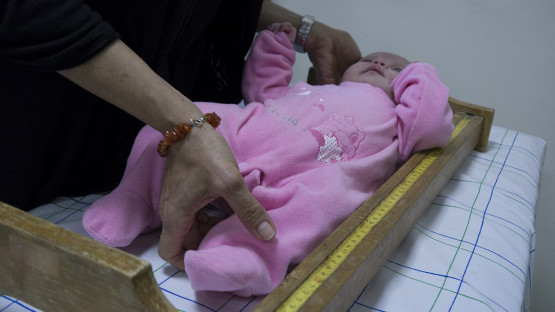In Benin, one of the countries taking part in the interregional project, the technique was used to evaluate a programme, titled Nutrition at the Centre, carried out in Dangbo and Bonou in the south of the country. As Benin has an exclusive breastfeeding rate of under 50 percent, improving the breastfeeding rate was one of the main aims of the country’s stunting reduction programme.
The nutrition programme was led by national experts and CARE International Benin/Togo, and brought together women in the community to share their experiences and promote best practices in breastfeeding. The dose-to-mother technique was used to compare the feeding practices of the women and children involved in the programme, with a control group. Analysis after six months showed that the mothers involved in the programme were fourteen times more likely to practice exclusive breastfeeding than mothers not involved.
Dansou Victoire, a mother of two, participated in the programme. “I decided to practice exclusive breastfeeding with my second child,” she said. “I fed him only on breast milk for the first six months, and he was healthy and did not regularly fall ill like the other children his age in the neighbourhood who were already being introduced to other foods.”
The pilot programme, including the use of the deuterium oxide dose-to-mother technique, is now in the process of being extended to other municipalities in localities across Benin.
“This programme is only the beginning,” said Waliou Amoussa Hounkpatin, a professor and researcher at the University of Abomey-Calavi’s Department of Nutrition and Food Sciences, and who facilitated the assessment. “With the IAEA support, through education and training in using the stable isotope technique as well as providing expert advice throughout the duration, the communities’ confidence in the nutrition programme group was built up, which we hope will be a continuing trend in many more communities across the country.”
This World Breastfeeding Week, the WHO and UNICEF are calling on governments to protect and promote women’s access to skilled breastfeeding counselling to support mothers in starting and sustaining breastfeeding of their infants and young children, and to improve monitoring and implementation of national breastfeeding programmes.
The known benefits of exclusive breastfeeding for children include protection against infections and reduced risk of overweight or diabetes, among others. The benefits of breastfeeding for mothers include protection against breast cancer, and possible protection against ovarian cancer and type 2 diabetes, among others.






